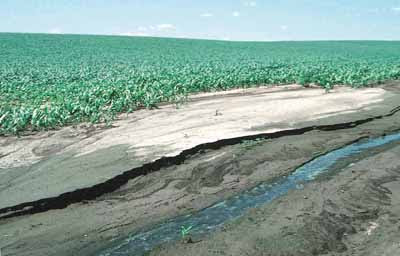 |
| Water Erosion |
Erosion also contributes to water pollution, as soil, fertilizers, and other industrial chemicals are swept into waterways. Air pollution is also another side effect of severe erosion, with dust particles blown into the air clogging up the atmosphere.
Tillage is the practice of preparing the soil for planting by turning up the soil, breaking up dirt clods, and shaping the field into irrigation beds or smoothing it out for planting, loosening and aerating the soil, mixing in organic material evenly throughout the soil, and destroys weeds.
 |
| Rice terraces in the Phillipines |
 |
| Corn growing right into last years crop residue |
Minimum tillage is a soil conservation system with the goal of minimum soil manipulation necessary for successful crop production. Planting is done directly after harrowing, without further preparation of the soil being done. The top layer of the topsoil is lightly disked, just to break up the old crop residue. It is either then harrowed and a fall crop planted. Or, it is left to lie over winter with the rough disking done, and then in the spring, is harrowed, and seeded. This is a widely used, and very effective method of reducing soil erosion.
No-till farming is a relatively new technique in which the soil is left undisturbed, and the residue from the previous year's crop is left on the field to provide a protective ground cover for this year's plants. No-till farming increases the amount of water in the soil by helping to prevent evaporation, and decreases wind and water erosion since the ground has a cover of plant residue to hold the soil in place.
 |
| Direct-seeding a field |
 |
| Strip-tilling a cornfield |
Strip tillage is a soil conservation method in which only the strip of soil that will contain the seed is tilled. Most of the plant residue from the previous year's crop is left to provide protection to the new plants, and to help reduce erosion and increase soil quality as it decomposes. Strip tilling also allows the farmer to more accurately apply fertilizers and other agricultural chemicals.
As the world's population expands and the demand for food increases, it is becoming more and more important to preserve and maintain the soil at the highest level possible in order to meet these demands. Like fresh water, oil, and gold, soil is not an infinite resource, especially high-quality, productive soil. It must be carefully cultivated and preserved, and used efficiently. Farmers around the world have combated the erosion of soil since the beginning of time, and are continuing this battle yearly, although they now have a wide range of information and technology to assist them.
For more information on erosion, visit these sites:
http://en.wikipedia.org/wiki/Erosion
http://directseed.org/about/
http://en.wikipedia.org/wiki/No-till_farming
http://www.no-tillfarmer.com/
http://en.wikipedia.org/wiki/Strip-till
http://www.striptillfarmer.com/

No comments:
Post a Comment